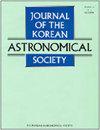The Millimeter-Radio Emission of BL Lacertae During Two γ-ray Outbursts
IF 0.8
4区 物理与天体物理
Q3 ASTRONOMY & ASTROPHYSICS
引用次数: 2
Abstract
We present a study of the inexplicit connection between radio jet activity and gamma-ray emission of BL Lacertae (BL Lac; 2200+420). We analyze the long-term millimeter activity of BL Lac via interferometric observations with the Korean VLBI Network (KVN) obtained at 22, 43, 86, and 129 GHz simultaneously over three years (from January 2013 to March 2016); during this time, two gamma-ray outbursts (in November 2013 and March 2015) can be seen in gamma-ray light curves obtained from Fermi observations. The KVN radio core is optically thick at least up to 86 GHz; there is indication that it might be optically thin at higher frequencies. To first order, the radio light curves decay exponentially over the time span covered by our observations, with decay timescales of 411+/-85 days, 352+/-79 days, 310+/-57 days, and 283+/-55 days at 22, 43, 86, and 129 GHz, respectively. Assuming synchrotron cooling, a cooling time of around one year is consistent with magnetic field strengths B~2microT and electron Lorentz factors gamma~10,000. Taking into account that our formal measurement errors include intrinsic variability and thus over-estimate the statistical uncertainties, we find that the decay timescale tau scales with frequency nu like tau~nu^{-0.2}. This relation is much shallower than the one expected from opacity effects (core shift), but in agreement with the (sub-)mm radio core being a standing recollimation shock. We do not find convincing radio flux counterparts to the gamma$ray outbursts. The spectral evolution is consistent with the `generalized shock model' of Valtaoja et al. (1992). A temporary increase in the core opacity and the emergence of a knot around the time of the second gamma-ray event indicate that this gamma-ray outburst might be an `orphan' flare powered by the `ring of fire' mechanism.两次γ射线爆发期间BL Lacertae的毫米无线电发射
我们研究了射电喷流活动与BL Lacertae (BL Lac)的伽马射线发射之间的不明确联系;2200 + 420)。2013年1月至2016年3月,利用韩国VLBI网络(KVN)在22、43、86和129 GHz同时进行的干涉观测,分析了BL Lac的长期毫米活动;在此期间,两次伽马射线爆发(2013年11月和2015年3月)可以从费米观测得到的伽马射线光曲线中看到。KVN无线电核心的光学厚度至少高达86 GHz;有迹象表明,在更高的频率下,它可能是光学薄的。第一级,射电光曲线在我们观测的时间范围内呈指数衰减,衰减时间尺度分别为411+/-85天,352+/-79天,310+/-57天和283+/-55天。假设同步加速器冷却,一年左右的冷却时间符合磁场强度B~2microT和电子洛伦兹因子gamma~10,000。考虑到我们的形式测量误差包括固有变异性,从而高估了统计不确定性,我们发现衰减时间标度的频率为τ ~nu^{-0.2}。这种关系比不透明效应(地核偏移)所期望的要浅得多,但与(亚)毫米射电地核是一个持续的再准直冲击一致。我们没有发现与伽马射线爆发相对应的令人信服的无线电通量。光谱演化与Valtaoja等人(1992)的“广义激波模型”一致。核心不透明的暂时增加和第二次伽马射线事件前后出现的一个结表明,这次伽马射线爆发可能是由“火环”机制驱动的“孤儿”耀斑。
本文章由计算机程序翻译,如有差异,请以英文原文为准。
求助全文
约1分钟内获得全文
求助全文
来源期刊

Journal of the Korean Astronomical Society
地学天文-天文与天体物理
CiteScore
1.30
自引率
10.00%
发文量
0
审稿时长
>12 weeks
期刊介绍:
JKAS is an international scientific journal publishing papers in all fields of astronomy and astrophysics. All manuscripts are subject to the scrutiny of referees. Manuscripts submitted to JKAS must comply with the ethics policy of JKAS. Six regular issues are published each year on February 28, April 30, June 30, August 31, October 31, and December 31. One year''s issues compose one volume.
 求助内容:
求助内容: 应助结果提醒方式:
应助结果提醒方式:


